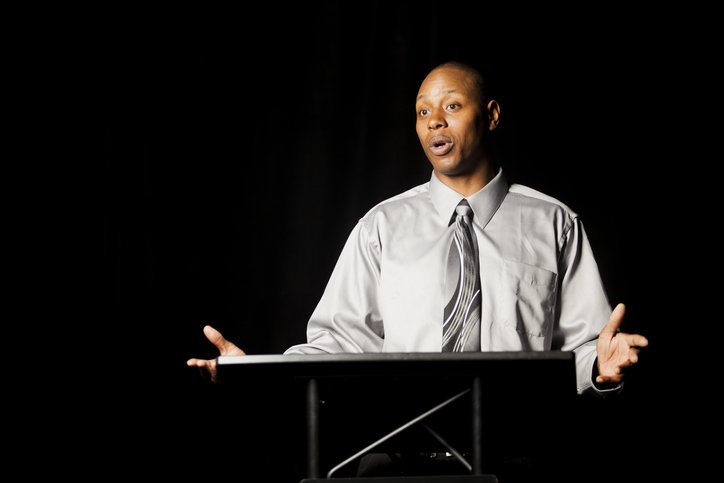Important Tips for a Memorable Eulogy
Writing a meaningful eulogy may seem like a daunting task. You may have mixed emotions about it, too.
Part of you likely is honored by the request but you may also feel anxious and not sure how to begin. Relax! By following these simple pointers, you can create and deliver a fitting speech that will honor your loved one.

- Get organized. Before you start writing the eulogy, brainstorm ideas for points you want to include. Then, compile the stories and gather supporting materials for your speech. This could include biographical information about the deceased, such as his or her date and place of birth; names of relatives; date of marriage; career achievements; etc. Then, organize your ideas by putting them into an outline. Your eulogy should have a logical flow to it.
- How much humor is appropriate? Decide on how serious or high-spirited you want the eulogy to be. Was your loved one a jokester or more on the somber side? If done tastefully, adding a bit of humor to a eulogy can help convey the personality of the deceased. It’s important to note that the amount of humor that’s appropriate ultimately depends on the circumstances surrounding the death of the deceased. For example, if a teen met an untimely death, the eulogy should take on a more serious tone than if the eulogy is about a grandparent who lived a long, happy life.
- Write the introduction. In your opening statement, acknowledge why everybody is assembled. For example, “We are gathered here today to remember the life of Sally Smith and to celebrate what she meant to us all.” Then, introduce yourself and your relationship to the deceased. This is also a good time to thank guests for attending the funeral or memorial service.
- Create a brief biography of the decedent’s life. Jot down when and where the deceased was born, who was in his or her birth family, significant family events, and any other interesting family details. If the deceased was married at the time of his or her death, talk about his or her spouse. Also be sure to mention any children, grandchildren, or other close family members.
- Share special memories of and qualities about the deceased. Include your loved one’s life achievements, talents, hobbies and passions. Also discuss his or her special traits and qualities, such as being smart, selfless, kind, generous, funny, etc. Think about all of things that made him or her so exceptional.
- Be a storyteller. Audiences connect with stories more than facts and figures. Stories are also an important way we remember loved ones and keep their memories alive even after they’re gone. Sharing anecdotes during your eulogy will help the audience to relate to the deceased and will give them greater insight into the kind of person her or she was. Be sure to choose stories that everybody can appreciate. When preparing your eulogy, you should also talk to close friends and family members about their special memories of the deceased. They may also have some interesting or funny stories that you could use in the eulogy and will appreciate being included. Even if you can’t use all of their suggestions, sharing stories and fond memories helps the grieving process.
- Write the closing. The best eulogies end with words of comfort and a final goodbye. You might start this section by talking about the lessons that the deceased taught you and how he or she impacted your life. Close your eulogy by saying goodbye to your loved one in a way that is most meaningful to you.
- Practice makes perfect. You may have butterflies in your stomach when you deliver the eulogy. That’s perfectly natural and should be expected, even if you are accustomed to public speaking and have good presentation skills. You are also likely to be very emotional while delivering your eulogy. The loss is fresh and under these trying circumstances, it’s easy to lose track of your thoughts. You’ll feel much more confident if you practice your speech plenty of times beforehand. Repetition will help you memorize your speech, which will be a big advantage if you become nervous or emotional. Reading the eulogy out loud to yourself also help you recognize which parts are likely to make you emotional. Being forewarned can make it easier to get through those sections on the day you deliver it. In addition to reading the eulogy aloud to yourself, read it to a family member or friend in order to get their constructive feedback.
- Bring your notes with you. You should have your speech with you in case your mind goes momentarily blank. Write your notes in large type so you can refer to them quickly and easily. Your eulogy will come across as more genuine and heartfelt if you don’t read if word for word off of a piece of paper. Make eye contact with your audience as often as you can.
- Above all, be yourself. You were chosen to deliver the eulogy for a reason. You likely had a very special relationship with the deceased. Let that relationship, and what it meant to you, shine through in your eulogy. And don’t worry about perfection. Talk to the audience like you would talk to your friends. Be yourself and your speech will come across as genuine, meaningful and memorable.
Still having trouble finding the right words for your eulogy? Our knowledgeable, compassionate funeral directors are here to help. Please reach out to us anytime.
About Batchelor Brothers Funeral Services: As a leading African American-owned and operated funeral and cremation organization serving three states, Batchelor Brothers Funeral Services has provided a ministry of care to thousands of grieving families. We promise to provide our highest level of distinguished service and respect to families who entrust us to honor their loved one. In all aspects of the funeral process, we strive to be the absolute best and are honored to help preserve our clients’ legacies for future generations. For more information, please call us at 215-549-4700 or visit our website.







Comments